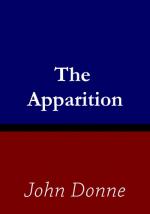|
This section contains 333 words (approx. 1 page at 400 words per page) |

|
The Apparition Summary & Study Guide Description
The Apparition Summary & Study Guide includes comprehensive information and analysis to help you understand the book. This study guide contains the following sections:
This detailed literature summary also contains Quotes and a Free Quiz on The Apparition by John Donne.
The version of this poem used to create this guide appears in: Donne, John and Donald Dickson (Editor). John Donne's Poetry. Norton, 2007.
Note that all parenthetical citations within the guide refer to the line number from which the quotation is taken.
Perhaps the most famous metaphysical poet in the English language, John Donne is known for his challenging and highly intellectual poetry. His work is often characterized by a reliance on extended metaphor, paradox, and the conflation of the spiritual and the erotic. Born into a recusant Catholic family, Donne eventually converted to Protestantism and became Dean of Saint Paul's under King James I. This religious journey often bleeds into his poetry, which frequently features both Catholic and Protestant imagery and themes. Critics have noted a marked difference between Donne's early poetry he composed while working as a lawyer at the Inns of Court and his later work written after becoming a member of the clergy. The early work, represented best by poems like "The Flea" and Donne's elegies, tends to indulge in eroticism and seduction. Donne's later poetry, by contrast, is more interested in the relationship between man and God. However, both erotic and spiritual elements are present—and indeed, often conflated—in poems across Donne's repertoire.
"The Apparition," a lesser-known poem of Donne's, is no exception. In it, an unnamed, presumably male speaker threatens to return as a ghost after his beloved has killed him with her rejection of his advances. He tells her that he will haunt her to a point where she, too, will understand the pain of solitude. At the end of the poem, the speaker offers the woman a chance to "repent" and avoid this future haunting (16). Despite its eerie mood and ghostly imagery, the poem represents an ironic attempt at seduction. Thus, while the poem lacks the flirtatious tone of Donne's other erotic poetry, it still relies on metaphysical devices like metaphor and paradox to dramatize the speaker's desire for requited affection.
Read more from the Study Guide
|
This section contains 333 words (approx. 1 page at 400 words per page) |

|



